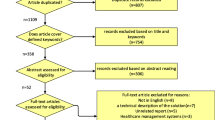Abstract
A chronic physical/mental disease not only has direct consequences for the chronically-ill older adults but can also alter the caregiver’s life. The objectives of this study were to identify burdens of community-dwelling older adults, characteristics of caregivers, severity of caregiver burden, and to develop supportive strategies. Caregivers of community-dwelling older adults were randomly interviewed between February and March 2012. Information on baseline characteristics and caregiver burden using Zarit Burden Inventory (ZBI) was collected. One hundred-fifty caregivers were interviewed. The mean ZBI was 20.8 + 11.3 [95 % CI 19.0, 22.7]. The majority of caregiver burden was classified as no burden (52 %). The age of caregivers, self-reported health status and duration of care had a positive relationship with ZBI scores while self-reported income had a negative one. Caregiver burden among Thai community-dwelling elder persons was small as most of those cared for had uncomplicated illness but this might be underestimated. Caregiver-dependent factors were more strongly associated with high burden than patient characteristics. Healthcare providers should consider these factors for interventions to alleviate burden.

Similar content being viewed by others
References
Garlo, K., O’Leary, J. R., Van Ness, P. H., & Fried, T. R. (2010). Burden in caregivers of older adults with advanced illness. Journal of the American Geriatrics Society, 58(12), 2315–2322.
Lim, J. W., & Zebrack, B. (2004). Caring for family members with chronic physical illness: A critical review of caregiver literature. Health and quality of life outcomes, 2, 50.
Zarit, S. H., Reever, K. E., & Bach-Peterson, J. (1980). Relatives of the impaired elderly: Correlates of feelings of burden. Gerontologist, 20(6), 649–655.
Baanders, A. N., & Heijmans, M. J. (2007). The impact of chronic diseases: The partner’s perspective. Family and community health, 30(4), 305–317.
Muangpaisan, W., Praditsuwan, R., Assanasen, J., Srinonprasert, V., Assantachai, P., Intalapaporn, S., et al. (2010). Caregiver burden and needs of dementia caregivers in Thailand: A cross-sectional study. Journal of the Medical Association of Thailand, 93(5), 601–607.
Arai, Y., Kudo, K., Hosokawa, T., Washio, M., Miura, H., & Hisamichi, S. (1997). Reliability and validity of the Japanese version of the Zarit caregiver burden interview. Psychiatry and Clinical Neurosciences, 51(5), 281–287.
Van Durme, T., Macq, J., Jeanmart, C., & Gobert, M. (2012). Tools for measuring the impact of informal caregiving of the elderly: A literature review. International Journal of Nursing Studies, 49(4), 490–504.
Toonsiri, C., Sunsern, R., & Lawang, W. (2011). Development of the burden interview for caregivers of patients with chronic illness. Journal of nursing and education, 4(1), 62–75.
Sorensen, S., Pinquart, M., & Duberstein, P. (2002). How effective are interventions with caregivers? An updated meta-analysis. Gerontologist, 42(3), 356–372.
Chirawatkul, A. (2008). Biostatistics for medical sciences (3rd ed.). Khon Kaen: Klang Na Na Wittaya.
Casado, B., & Sacco, P. (2011). Correlates of caregiver burden among family caregivers of older Korean Americans. Journals of Gerontology. Series B, Psychological Sciences and Social Sciences, 67(3), 331–336.
Somsak Chunharas (2007). Situations of the Thai elderly 2007 pp. 1000). Retrieved from the foundation of Thai Gerontology Research and development Institute (TGRI) database available from http://tgri.thainhf.org/document/edoc/edoc_771.pdf.
Higginson, I. J., & Gao, W. (2008). Caregiver assessment of patients with advanced cancer: Concordance with patients, effect of Burden and positivity. Health and quality of life outcomes, 6, 42.
Gort, A. M., Mingot, M., Gomez, X., Soler, T., Torres, G., Sacristan, O., et al. (2007). Use of the Zarit scale for assessing caregiver burden and collapse in caregiving at home in dementias. International journal of geriatric psychiatry, 22(10), 957–962.
Limpanichkul, Y., & Magilvy, K. (2004). Managing caregiving at home: Thai caregivers living in the United States. Journal of cultural diversity, 11(1), 18–24.
Acknowledgments
We wish to acknowledge the support of the Khon Kaen University Publication Clinic, Research and Technology Transfer Affairs, Khon Kaen University, for their assistance. This work was supported by the Neuroscience Research and Development Group, Khon Kaen University, Thailand.
Conflict of Interest
None.
Author information
Authors and Affiliations
Corresponding author
Rights and permissions
About this article
Cite this article
Limpawattana, P., Theeranut, A., Chindaprasirt, J. et al. Caregivers Burden of Older Adults with Chronic Illnesses in the Community: A Cross-Sectional Study. J Community Health 38, 40–45 (2013). https://doi.org/10.1007/s10900-012-9576-6
Published:
Issue Date:
DOI: https://doi.org/10.1007/s10900-012-9576-6




